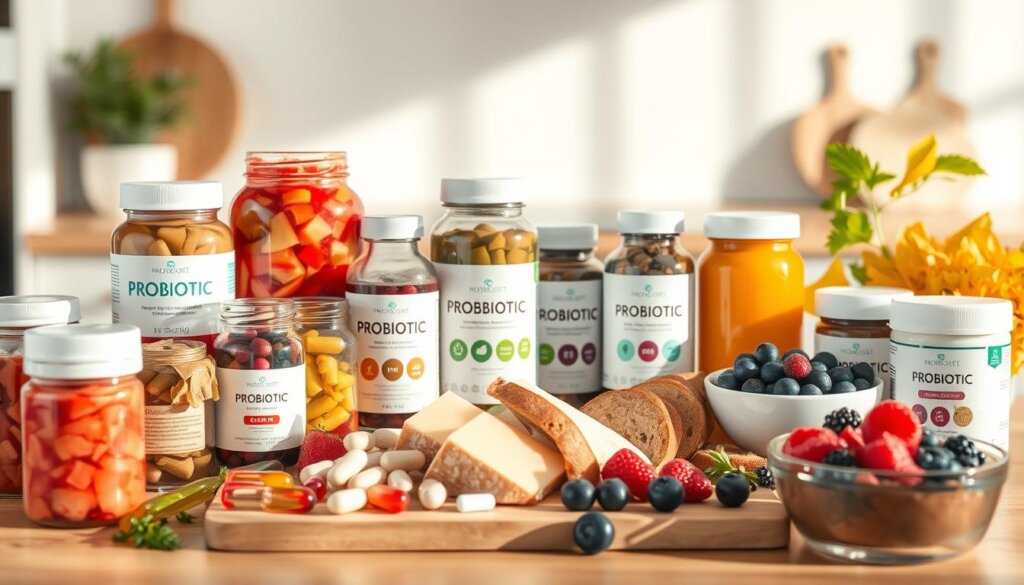What are the symptoms of lack of probiotics? Find Out Here
Many people struggle with fatigue, bloating, or frequent illnesses without understanding why. Could an imbalance in beneficial gut bacteria be the hidden culprit? These microorganisms play a vital role in digestion, immunity, and even mental wellness.
Modern lifestyles often disrupt our body’s natural balance. Processed meals, chronic stress, and medications like antibiotics can reduce populations of helpful microbes. When levels drop too low, the body sends signals – but many don’t recognize these warnings.
This guide explores how to spot potential probiotic shortages and take action. Readers will learn to connect common discomforts with gut health, discover practical solutions, and find when to consult experts. The journey to better wellness starts with understanding these microscopic allies.
Key Takeaways
- Probiotics support digestion, immunity, and nutrient absorption
- Antibiotics and processed foods reduce beneficial bacteria levels
- Unexplained fatigue or skin issues may signal microbial imbalance
- Early recognition helps prevent long-term complications
- Diet adjustments and supplements can restore gut harmony
Discovering the Role of Probiotics in Overall Health
Your gut hosts a living universe – over 200 species of bacteria, viruses, and fungi working nonstop. This microbial metropolis handles digestion, fights invaders, and even chats with your brain. When balanced, it becomes nature’s perfect wellness engine.
The Microbial Powerhouse Within
Trillions of microorganisms form a protective shield along your digestive tract. They break down food, extract nutrients, and produce vitamins like B12 and K. A diverse microbiome acts as:
| Healthy Gut | Imbalanced Gut |
|---|---|
| Strong immune response | Frequent infections |
| Efficient digestion | Bloating & discomfort |
| Stable mood | Brain fog |
Research reveals startling connections. “The gut microbiome influences conditions from diabetes to depression,” notes a 2023 gastroenterology study. This explains why probiotic deficiency signs often appear as skin issues or low energy.
Fermented foods like tempeh and kimchi feed beneficial bacteria. Combined with probiotic supplements, they help maintain microbial diversity. For Malaysians enjoying spicy cuisine, supporting gut balance becomes especially crucial.
“Your gut doesn’t just process meals – it shapes your health destiny through constant microbial teamwork.”
Modern science confirms the gut-brain axis links digestion to mental clarity. Personalized approaches now help people choose probiotics matching their unique bacterial makeup. It’s not just about eating well – it’s about nurturing an entire ecosystem.
What are the symptoms of lack of probiotics?
An imbalance in gut flora can manifest through various physical and mental signs. These clues often appear gradually, making them easy to dismiss as everyday stress or minor ailments. Learning to spot them early helps maintain digestive harmony and overall wellness.

Digestive Red Flags
Persistent bloating after meals often signals insufficient beneficial bacteria. Irregular bowel patterns – swinging between constipation and diarrhea – indicate struggling gut microbes. Other common distress signals include:
| Symptom | Possible Cause |
|---|---|
| Excessive gas | Poor carbohydrate breakdown |
| Abdominal cramps | Inflammation in gut lining |
| Heartburn | Imbalanced stomach acid levels |
Food intolerances might develop when key digestive enzymes aren’t produced adequately. Many people report new sensitivities to previously tolerated foods during microbial imbalances.
Mental and Energy Shifts
The gut-brain axis links digestive health to emotional states. Low probiotic levels frequently correlate with mood swings and concentration difficulties. Some experience “brain fog” – struggling to recall words or follow conversations.
Chronic fatigue often accompanies these imbalances, even after sufficient sleep. Research shows gut bacteria produce about 90% of serotonin, explaining why microbial shortages might dampen mood. Energy crashes after meals could indicate poor nutrient absorption from compromised gut function.
“The gut doesn’t just process food – it helps regulate our emotional weather patterns through chemical messengers.”
Recognizing Additional Indicators of Probiotic Deficiency
Your body’s defense network and outer appearance often reveal hidden gut imbalances. Beyond digestive discomfort, immune responses and skin health serve as clear windows into microbial harmony. When beneficial bacteria dwindle, these systems sound alarms through unexpected changes.
Immune System and Skin Reactions
Frequent colds or slow-healing cuts suggest weakened defenses. A healthy gut trains immune cells to distinguish threats from harmless substances. Without enough good bacteria, this education falters – leading to overreactions to pollen or underperformance against viruses.
Skin often mirrors gut turmoil. Conditions like eczema or acne flare when inflammation spikes. Research shows 70% of immune cells reside near the gut, explaining why rashes might signal microbial shortages. Even stubborn dandruff could indicate fungal overgrowth from missing bacterial balance.
Autoimmune risks rise when gut diversity drops. The microbiome helps regulate immune attacks on healthy tissue. Persistent infections – whether yeast or urinary – often trace back to insufficient probiotic support. Joint pain and fatigue may follow as inflammation spreads.
“The gut-immune partnership shapes our resilience – neglect one, and both suffer.”
Seasonal allergies intensifying? Gut bacteria help process environmental triggers. Many people report new food sensitivities during probiotic shortages. Restoring microbial balance often calms these reactions, easing both sniffles and skin flare-ups.
The Benefits of Probiotic Supplements and Fermented Foods

Restoring gut balance requires strategic choices – both in pill form and on your plate. Targeted supplements and traditional fermented foods work together to repopulate your microbiome with friendly microorganisms. This dual approach offers flexibility for different lifestyles while delivering health benefits that extend beyond digestion.
Advantages of Taking Probiotic Supplements
High-quality probiotic supplements provide concentrated doses of specific bacterial strains. They’re ideal for travelers or those with dietary restrictions. Key advantages include:
| Feature | Supplements | Fermented Foods |
|---|---|---|
| Strain Specificity | Tailored formulas | Natural variety |
| Convenience | Portable & consistent | Require meal prep |
| Potency | Guaranteed CFUs* | Variable levels |
*Colony Forming Units
Multi-strain formulas mimic natural gut diversity better than single-strain options. For Malaysians juggling busy schedules, supplements ensure daily intake without kitchen time. Many probiotic benefits like immune support appear within weeks of consistent use.
Top Fermented Foods for Gut Health
Traditional fermentation creates living food pharmacies. Unpasteurized kimchi and tempeh (popular in Malaysian markets) deliver probiotics plus enzymes. Top choices include:
- Kefir: 30+ strains in tangy drinkable yogurt
- Sauerkraut: Fiber-rich cabbage with vitamin C boost
- Kombucha: Fizzy tea packed with acetic acid
Pair these with prebiotic foods like bananas and oats. This combo feeds existing bacteria while introducing new strains. Always check labels for “live cultures” – heat-treated products won’t provide the same gut health benefits.
“Fermentation turns ordinary ingredients into microbial powerhouses – nature’s original preservation method becomes our modern wellness hack.”
Possible Side Effects When Taking Probiotics
Introducing probiotics can sometimes lead to unexpected reactions as the gut adapts. While generally safe, these supplements and foods interact uniquely with each person’s microbiome. Temporary adjustments are common, but knowing how to respond ensures a smoother transition to better gut health.
Managing Digestive and Allergic Reactions
New users often report mild gas or bloating during the first week. These effects typically fade as the gut adjusts. Starting with half the recommended dose helps minimize discomfort. Gradually increase intake over 2-3 weeks for better tolerance.
| Common Reaction | Solution | Timeframe |
|---|---|---|
| Bloating | Reduce dose by 50% | 3-7 days |
| Constipation | Switch to bacteria-based strains | 2-4 days |
| Headaches | Avoid histamine-producing strains | 24-48 hours |
Fermented foods sometimes trigger headaches due to natural compounds called biogenic amines. Supplements offer an alternative for sensitive individuals. Always check labels for dairy, soy, or yeast ingredients if allergies exist.
Those with weakened immunity should consult a healthcare professional before starting probiotics. Recent surgery patients and people using antibiotics face higher infection risks. Medical supervision helps balance benefits and potential complications.
“Probiotics are allies, not invaders – introduce them thoughtfully to avoid overwhelming your system.”
Most reactions resolve quickly as the gut ecosystem stabilizes. Persistent symptoms lasting over two weeks warrant professional advice. Tracking daily changes helps identify triggers and optimize bacterial balance.
Insights from Recent Probiotic Research
Science continues to reveal surprising connections between gut microbes and overall wellness. Cutting-edge studies now explore how these microscopic allies influence everything from mood to metabolic health, reshaping our approach to daily wellbeing.
Key Findings and Study Highlights
Groundbreaking research shows specific probiotic strains like Lactobacillus and Bifidobacterium ease abdominal discomfort in IBS patients. A 2023 review found 68% of participants reported reduced pain after consistent use.
Mental health discoveries surprise many. Studies link probiotic supplements to fewer depressive episodes and calmer emotional responses. This aligns with findings that gut bacteria produce neurotransmitters affecting brain function.
Sleep quality improvements emerge as another benefit. Trials suggest certain probiotics may lower insomnia risk by regulating stress hormones. Participants using specific probiotic strains reported falling asleep 15% faster on average.
While results excite researchers, experts caution that effects vary between individuals. Ongoing studies aim to personalize probiotic regimens based on unique gut profiles. For Malaysians exploring these options, combining quality supplements with traditional fermented foods offers promising results.
FAQ
How does the gut microbiome affect overall health?
A balanced gut microbiome supports digestion, nutrient absorption, and immune function. It also influences mental clarity, energy levels, and skin health by interacting with bodily systems.
Can low probiotic levels cause mood changes?
Yes. Research links gut health to brain function through the gut-brain axis. Fatigue, anxiety, or difficulty concentrating may signal an imbalance in beneficial bacteria.
What skin issues suggest a probiotic deficiency?
Frequent rashes, eczema flare-ups, or acne might indicate poor gut health. The microbiome helps regulate inflammation, which can manifest externally when disrupted.
Are fermented foods enough to restore gut bacteria?
Foods like yogurt, kimchi, and kefir provide natural probiotics. However, supplements with diverse strains may be necessary for severe deficiencies or specific health goals.
Do probiotics interact with antibiotics?
Antibiotics can reduce gut bacteria diversity. Taking probiotics during or after treatment may help replenish good microbes and minimize side effects like diarrhea.
Can probiotics improve immune responses?
Studies show certain strains strengthen immune defenses by crowding out harmful pathogens. Individuals with frequent infections might benefit from probiotic-rich diets or supplements.
What are common side effects of probiotic supplements?
Some experience bloating or gas as the gut adjusts. Starting with low doses and choosing reputable brands like Culturelle or Renew Life can ease this transition.
How does recent research view probiotic benefits?
A 2023 review in Nutrients highlights their role in managing IBS and allergies. Ongoing studies explore links to metabolic health and mental well-being.

Khloe Tan
Khloe Tan is a Certified Nutritionist, Corporate Wellness Trainer, and Holistic Health Specialist with over 15 years of experience in the health and wellness industry. She has delivered more than 100 talks nationwide, inspiring and educating diverse audiences on nutrition, lifestyle, and sustainable wellness. Her work has positively impacted over 3,000 lives, and she continues to champion holistic approaches to well-being in both corporate and personal settings.





